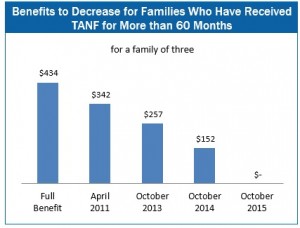Chairman Graham and members of the committee, thank you for the opportunity to testify today. My name is Kate Coventry, and I am a policy analyst with the DC Fiscal Policy Institute. DCFPI engages in research and public education on the fiscal and economic health of the District of Columbia, with a particular emphasis on how policies impact low-and-moderate income families. 
I am here today to testify on the negative effects that Temporary Assistance for Needy Families (TANF) time limits and benefit cuts have on families. DCFPI also supports and urges the DC Council to pass the “Temporary Assistance for Needy Families Long-Term Recipient Benefit Reduction Amendment Act of 2014.” This bill would repeal the 41.7 percent TANF benefit cut that took place on October 1st for more than 6,000 families.
Temporary Assistance for Needy Families (TANF) provides cash assistance and job training for low-income families with children. TANF helps provide support for one in three children in the District and the assistance it provides each month plays a critical role in their well-being.
More than 6,000 families who had their benefits cut on October 1st have already experienced two rounds of benefit cuts and were receiving just $257 per month for a family of three through fiscal year (FY) 2014. (See Figure.) Now these benefits have fallen to just $152 per month, clearly too little to meet a family’s needs. Even the full benefit amount, which brings families to less than a third of the poverty line, leaves many families in a state of constant crisis. When DCFPI held focus group with TANF parents, they reported that both their TANF and SNAP (Supplemental Nutrition Assistance Program, commonly known as food stamps) benefits run out before the end of each month.[1] Families go hungry, face eviction, and sometimes must turn to illegal activities to make it through the month.
The deep poverty that these TANF families experience threatens the success of the District’s children. A substantial body of research has found that children in poverty:
- score lower on tests of cognitive skills;
- have more behavior problems;
- are more likely to have a child at a young age;
- are more likely to drop out of high school;
- if they do graduate, are less likely to start or graduate from college; and
- more likely to be poor as adults.[2]
New neuroscience research from the Harvard University’s Center on Child Development has found that some of these effects are related to the “toxic stress” ‘ or the result of being continuously exposed to stress ‘ that poor young children are more likely to experience. Toxic stress makes it hard for children to develop executive function skills ‘ or skills related to attention, memory and language ‘ leading to poorer outcomes in adulthood.[3] Their research shows that income matters and boosts in income for low-income families with young children can have an impact on the children’s achievement and earnings as adults.
[1] Voices for Change: Perspectives on Strengthening Welfare-to-Work From DC TANF Recipients by Katie Kerstetter and Joni Podschun. DCFPI and So Others Might Eat (SOME). www.dcfpi.org/wp-content/uploads/2009/11/11-12-09TANFreport.pdf
[2] The Foreseeable Harm from Governor Brown’s Proposal to Reduce CalWorks Grants for Children by Michael Herald and Jessica Bartholow. March 2011.
[3] The Long Reach of Early Childhood Poverty: Pathways and Impacts: Q&As with Drs. Greg Duncan, Katherine Magnuson, Tom Boyce and Jack Shonkoff. developingchild.harvard.edu/index.php/download_file/-/view/623/“Ž
